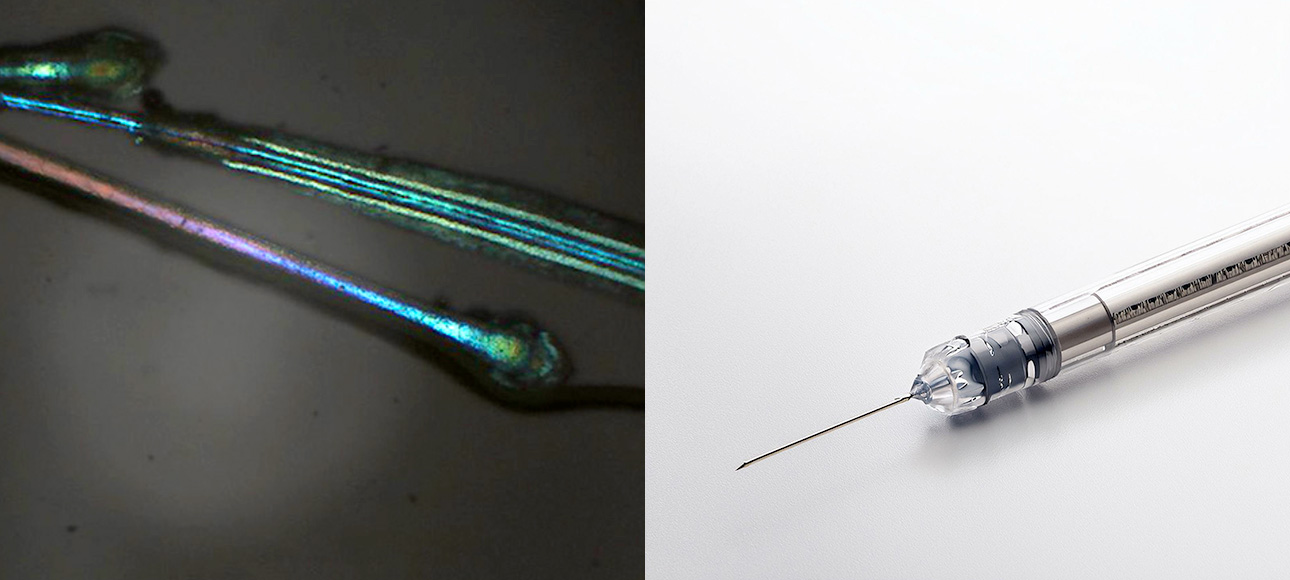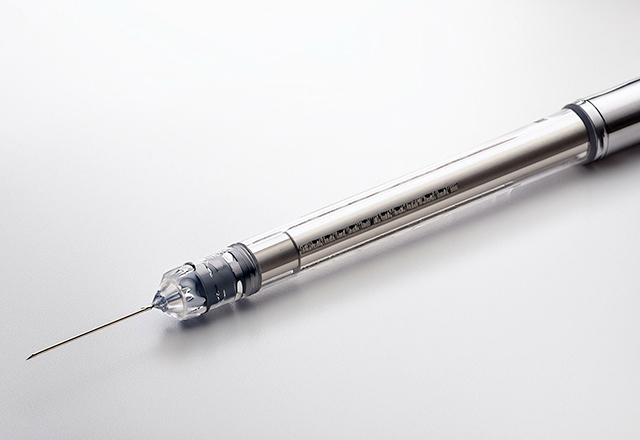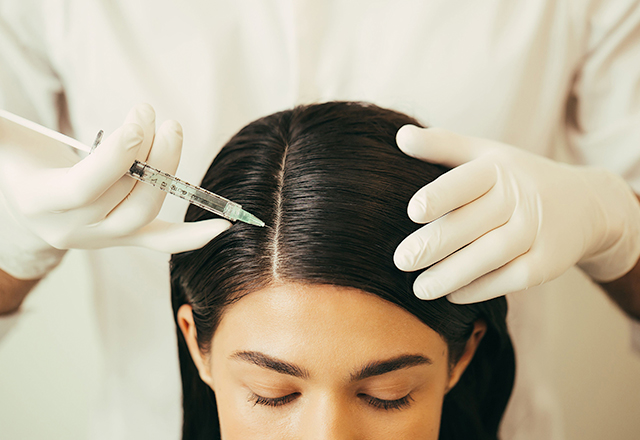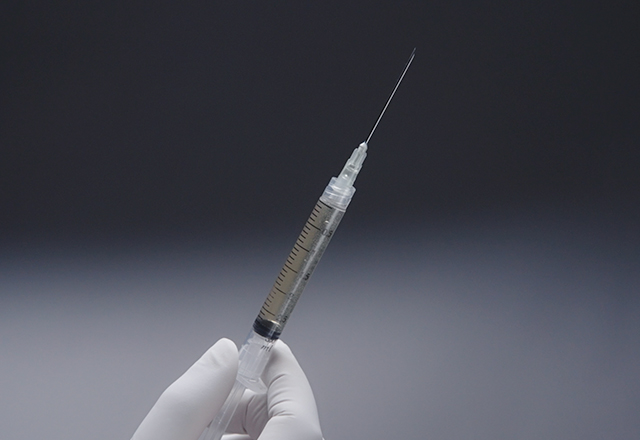
Medications like Ozempic, Wegovy and Mounjaro, originally developed to manage type 2 diabetes, are now increasingly used to support weight loss.
But while their effects on appetite, blood sugar and metabolic function are well documented, there’s a growing conversation around a less-discussed side effect: hair loss.
Though not official byproduct of taking GLP-1’s, increasing numbers of users are reporting unexpected shedding, and wondering if it’s the medication, the diet, or a combination of both that’s to blame. According to trichologist Ricardo Vila Nova, the root cause is rarely the medication itself. Instead, “it’s the physiological and hormonal impact of rapid weight loss that places stress on the body, and the hair is often one of the first places that impact becomes visible.”

Why does hair shed during weight loss?
GLP-1 receptor agonists work by slowing digestion and reducing appetite. As calorie intake drops, so too does the intake of key nutrients like iron, protein, vitamin D, B12, and zinc – all of which are essential for healthy hair growth.
“Our hair is not essential for survival, so during periods of stress or imbalance, the body will always prioritise vital organs first – leaving our hair high and dry. Not only that, but our hair follicles are very sensitive to changes, particularly in nutrition and hormone levels, and these changes can have profound effects on the appearance of our tresses,” explains Vila Nova. “
When levels of key nutrients drop, telogen effluvium can ensue. This type of hair loss sees follicles shift prematurely into the resting phase, which leads to more hair shedding than usual.
It’s not uncommon for this shedding to begin several weeks, or even a few months after the initial trigger. “So, by the time you notice more hair in the shower or thinning, the root cause has already been at play for a while,” Vila Nova adds.

Speed matters
Weight loss itself isn’t the issue, but how quickly you lose it can be. Dropping more than 1kg (about 2 pounds) per week is considered rapid, and this level of change can have hormonal consequences.
“When you lose weight quickly, you also lose fat stores that are involved in hormone production,” says Vila Nova. “This can reduce oestrogen levels and alter thyroid hormone activity, both of which influence the hair cycle.”
For women in particular, falling oestrogen levels can be especially problematic. Oestrogen helps to keep hair in its growing (anagen) phase for longer. A drop can trigger excessive shedding or cause the hair to thin, mimicking post-partum hair loss.
Thyroid function also plays a role. Even minor imbalances, especially if paired with lower iron or protein levels, can disrupt the scalp’s natural rhythm.

Who is most affected?
Not everyone who takes a GLP-1 drug will experience hair loss, but certain groups are more vulnerable. “Women are at greater risk, partly because of hormonal sensitivity, but also because their baseline iron and nutrient levels are often lower,” says Vila Nova.
Those with a history of androgenetic alopecia, traction alopecia, or thyroid conditions may also notice an increase in shedding once weight loss begins. “
These medications may not directly cause hair loss, but it’s important to understand that they can act as a physiological catalyst,” adds Vila Nova. “They may unmask hormonal or nutritional imbalances that were already there, accelerate underlying conditions that were previously dormant, or create major hormonal shifts that unless addressed, can tip the hair into a longer-term cycle of loss.”

How Ozempic hair loss presents
Some users report a diffuse thinning all over the scalp, while others notice patchier loss at the temples or crown. “It’s rarely total hair loss, but it can be a shock, especially for women who’ve never had any issues with hair loss before,” says Vila Nova. “And because there’s often a three-month lag between the trigger and the visible fallout, many don’t connect the dots straight away.”
The good news? In most cases, it’s temporary. But regrowth hinges on a few key factors – these include, how quickly the cause is identified and addressed. “Hair follicles have a cycle, and if you catch telogen effluvium early, the cycle can normalise. But if the stress on the system continues, the follicle can miniaturise, leading to longer-term thinning,” warns Vila Nova.

What can you do to support your hair?
Prevention begins before the first injection. “If you’re considering GLP-1 medications, it’s best to undergo a full blood panel that checks iron, ferritin, vitamin D, B12, folate, and thyroid hormone levels. It’s also wise to book in for our signature Hair DNA Scan, as this can also identify deficiencies and early signs of hair health issues that would need to be addressed and supported so as not to worsen when GLP-1 use begins,” says Vila Nova.
While you’re on the likes of Ozempic, Wegovy and Mounjaro, monitoring is key as are regular hair treatments, particularly if weight loss is occurring at a fast pace. Vila Nova also stresses the importance of protein. “Hair is made of keratin, which comes from amino acids. If protein intake drops, the scalp simply doesn’t have the raw materials it needs.”

Can hair recover?
The outlook depends on timing. In many cases, yes, especially if the shedding is due to telogen effluvium. But if the hair has entered a miniaturisation cycle, or if the shedding has gone on unchecked for several months, recovery may be slower.
“The earlier we intervene, with regenerative treatments like biosomes, light therapy, and microneedling the better the outcome,” says Vila Nova. “We’re not just treating the surface, we’re working at the level of biology to stimulate the scalp, boost blood flow, and reawaken dormant follicles.” But note that these treatments work best when combined with nutritional correction and lifestyle support.

Be prepared
Hair loss during GLP-1-based weight loss isn’t inevitable, but it is increasingly common. It doesn’t mean the medication is unsafe or ineffective. Rather, it’s a sign that the body is under pressure and in need of support.
“Hair is one of the best indicators of internal health, if it starts to change, don’t ignore it. That’s your signal to pause, assess, and rebalance,” shares Vila Nova.
By taking a preventative approach, monitoring nutritional status, and seeking professional advice at the first sign of shedding, it is possible to maintain, and even improve your hair health while on weight-loss medications.
Book in for a Hair DNA Scan to assess the health or your tresses and support each and every strand during your weight loss journey.


